8 Houseplants That Improve Your Mental Health, Science Says
Bringing nature indoors may come with major mood-boosting benefits.
Ample research shows that spending time among plants in nature has major mental health benefits, including lower stress levels, improved mood, longer attention spans, and reduced risk of psychiatric disorders, says the American Psychological Association (APA). Yet according to the Environmental Protection Agency (EPA), Americans live roughly 90 percent of their lives indoors, meaning the average person's actual time spent in nature is minimal—which is why a new scientific study that says houseplants can improve your mental health is so exciting.
The British study conducted last year by the University of Reading and the Royal Horticultural Society analyzed the psychological responses of 520 volunteers to 12 images of houseplants and determined that eight plants, in particular, appeared to boost their moods. Three of the plants were given added accolades for providing superior health benefits within that group.
However, there was one hitch: The plants only helped to boost participants' moods when they were green and thriving.
"Our findings suggest that plants with lush green leaves, high leaf area, and dense canopies are likely to give the biggest boost to your wellbeing," study co-author wrote Jenny Berger wrote in an article for PsyPost. "People also believe that these plants will provide greater benefits to air quality."
With that in mind, read on to find out which eight plants were found to improve mental health in the study, and to learn how to keep them in great shape.
READ THIS NEXT: 8 Easy Houseplants That Don't Need Sunlight.
1
Weeping fig
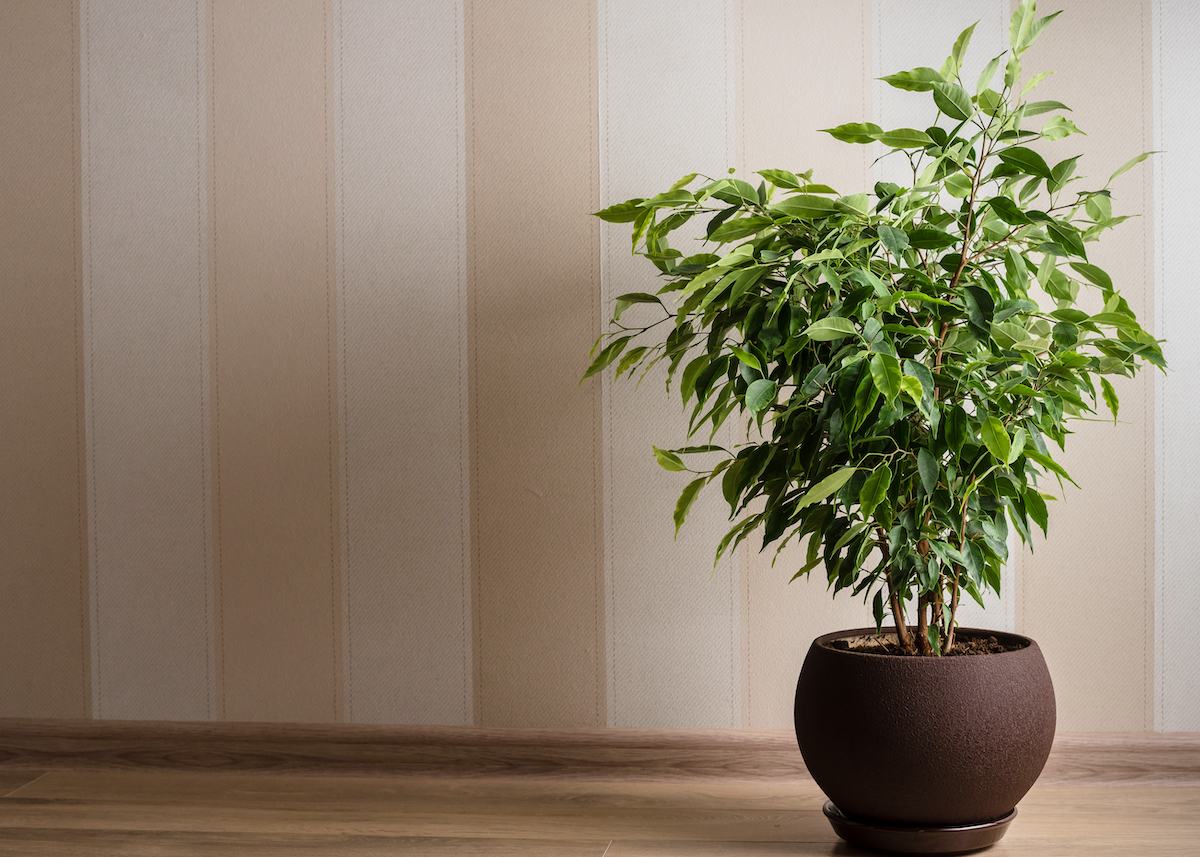
The weeping fig was one of the top three most effective plants for improving mood, according to the study. But that's not its only benefit, experts say.
"The weeping fig is known for its air-purifying properties, removing common indoor pollutants and improving air quality," explains Aaditya Bhatta, founder and editor for Plants Craze.
He says caring for the potted tree is relatively easy once you provide it with the right conditions: It thrives in bright, indirect light and prefers consistent watering. However, be sure to allow the top inch of soil to dry out between each watering.
Bhatta notes that beyond the benefits of any individual plant, the general practice of caring for plants comes with its own set of benefits.
"The act of nurturing and tending to plants can serve as a form of mindfulness or meditation, allowing individuals to focus on the present moment and find a sense of calm and relaxation," he says.
2
Snake Plant
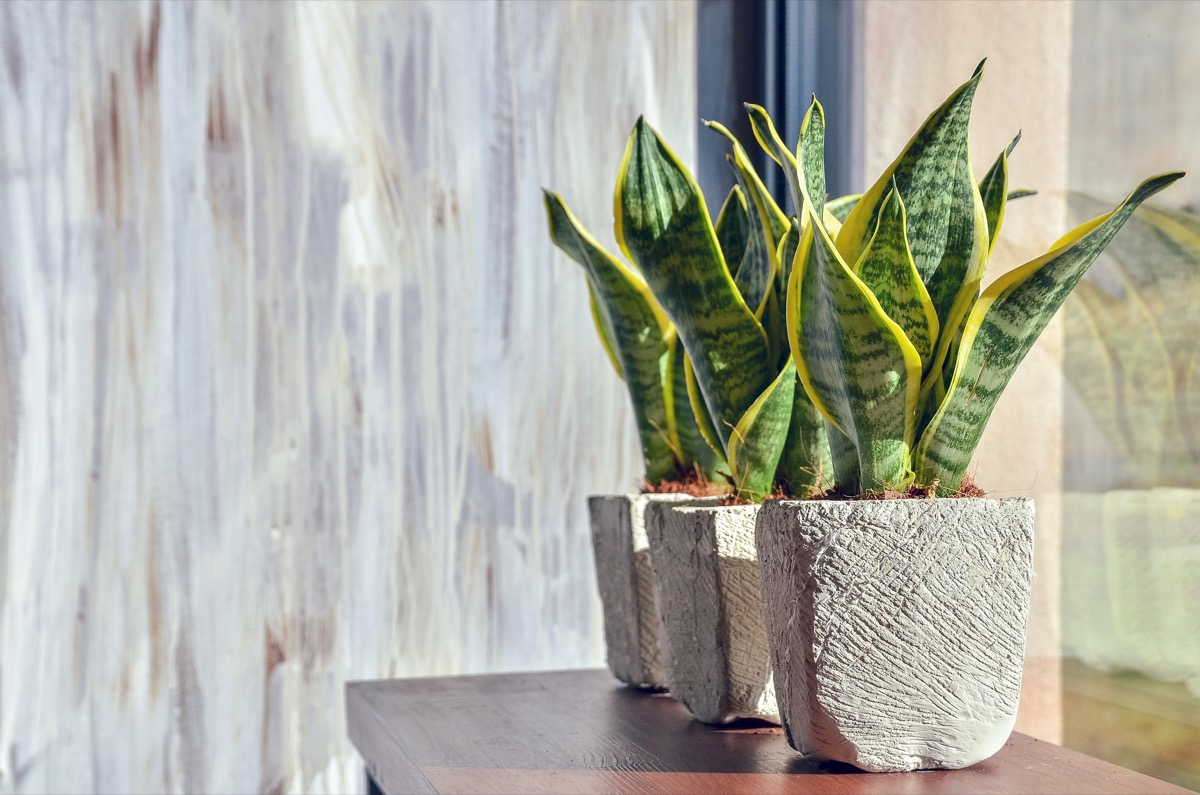
Mother-in-law's tongue—also known as a snake plant—is another low-maintenance option that can improve indoor air quality by converting carbon dioxide into oxygen and absorbing toxins from the air.
"It tolerates a wide range of light conditions, from low to bright, indirect light. Water it sparingly, allowing the soil to dry out between waterings," suggests Bhatta.
Diana Cox, founder of The Gardening Talk says that thanks to its high likelihood of thriving with minimal assistance, a snake plant is a great choice for beginners.
READ THIS NEXT: 10 Easy Hacks to Save Your House Plants That Gardeners Swear By.
3
Cactus
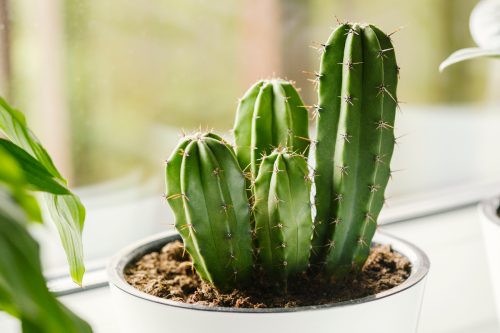
As we know, plants that are green and leafy tend to be considered most widely attractive (and therefore best for improving one's mood). Therefore, Cacti were found to be the most polarizing plants in the study and had a less calming effect compared with the other plants.
Subjects' reactions also hinged most heavily on whether the cacti were healthy. However, the researchers found that thriving cacti still made a positive impression, and had many of the same perceived benefits as other healthy plants in the study.
"There's no single best plant for boosting mood or reducing stress," explains Nolan Gajdascz, co-founder of Mental Houseplants, a website devoted to discussing the mental health benefits of indoor gardening. "In fact, the true benefits come more from the process and their presence than any specific properties unique to each plant."
Simply find a plant that "resonates with you" and practice mindful care for the best results, Gajdascz advises.
As a low-maintenance plant that requires minimal watering, the cactus is another great option for beginner plant parents. Just be sure to give them bright, indirect light and well-draining soil, says Bhatta. "Water infrequently, allowing the soil to dry out completely between waterings," he adds.
4
Prayer Plant
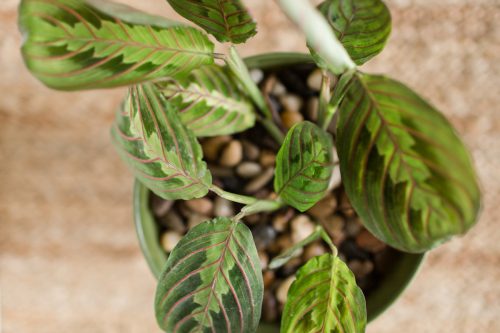
Prayer plants are another mood-boosting option. "The prayer plant is known for its beautiful foliage and can add vibrancy to indoor spaces," says Bhatta.
With broad green leaves and distinctive red and white markings, it can "stimulate visual interest and create a sense of liveliness and connection to nature," he adds.
The prayer plant is named after its most unique feature: At night, its leaves fold up like hands in prayer. Bhatta describes these leaf movements as "captivating and mesmerizing" and says observing this pattern "may have a calming effect and promote a sense of tranquility."
To care for the prayer plant, you'll need to provide bright, indirect light and consistently moist soil. For best results, "mist the leaves occasionally to increase humidity," Bhatta suggests.
READ THIS NEXT: 5 Houseplants That Ward Off Negative Energy, Experts Say.
5
Bird's Nest Fern
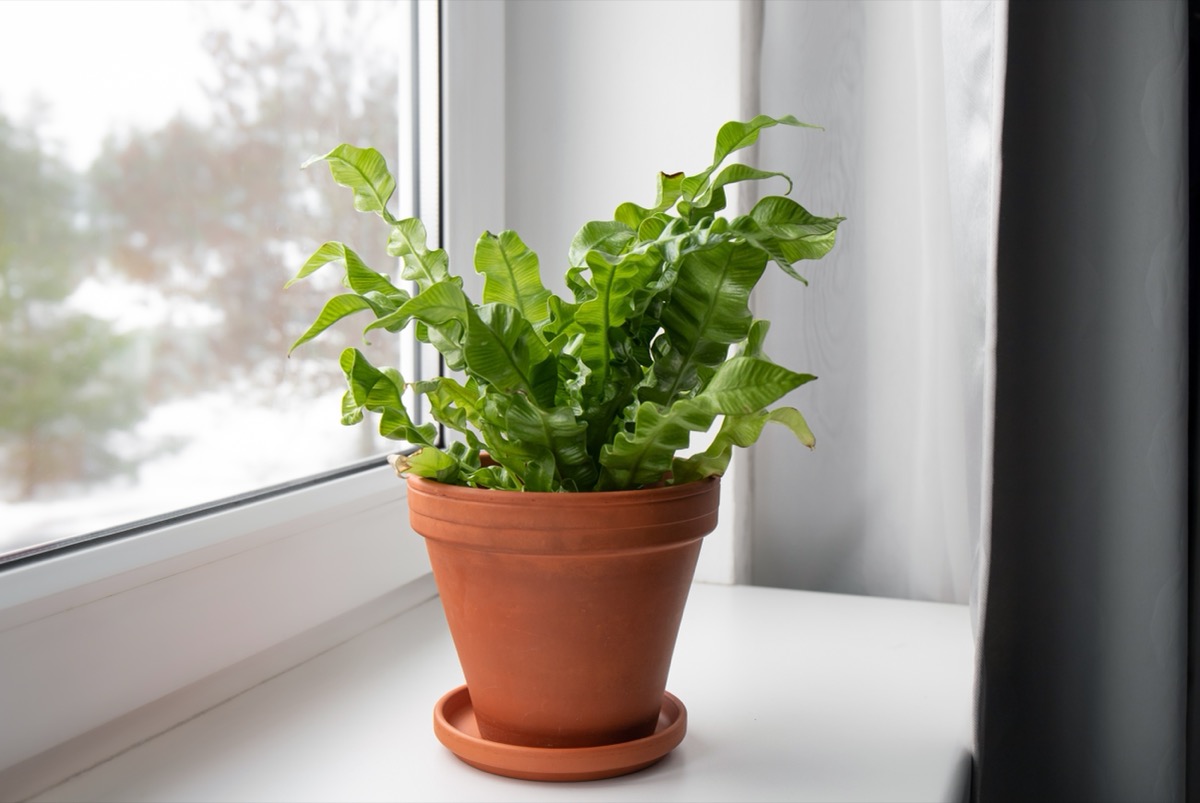
Bird's nest ferns are lush and uniquely textured. "As far as why this plant is a mood booster, it's possible that it has to do with aesthetics," says Miguel Camperos, VP of operations for the beekeeping and gardening supply company SunVara.
"The lush, vibrant green leaves of the ferns have a calming and soothing effect on the eyes. Surrounding yourself with nature is a great way to positively impact your mood, especially when the nature is as beautiful as this plant!" he says.
As for care, Bhatta suggests providing the plant with bright, indirect light, though he notes that it can tolerate lower light conditions. "Keep the soil evenly moist, and avoid both overwatering and drying out," he recommends.
6
Golden pothos
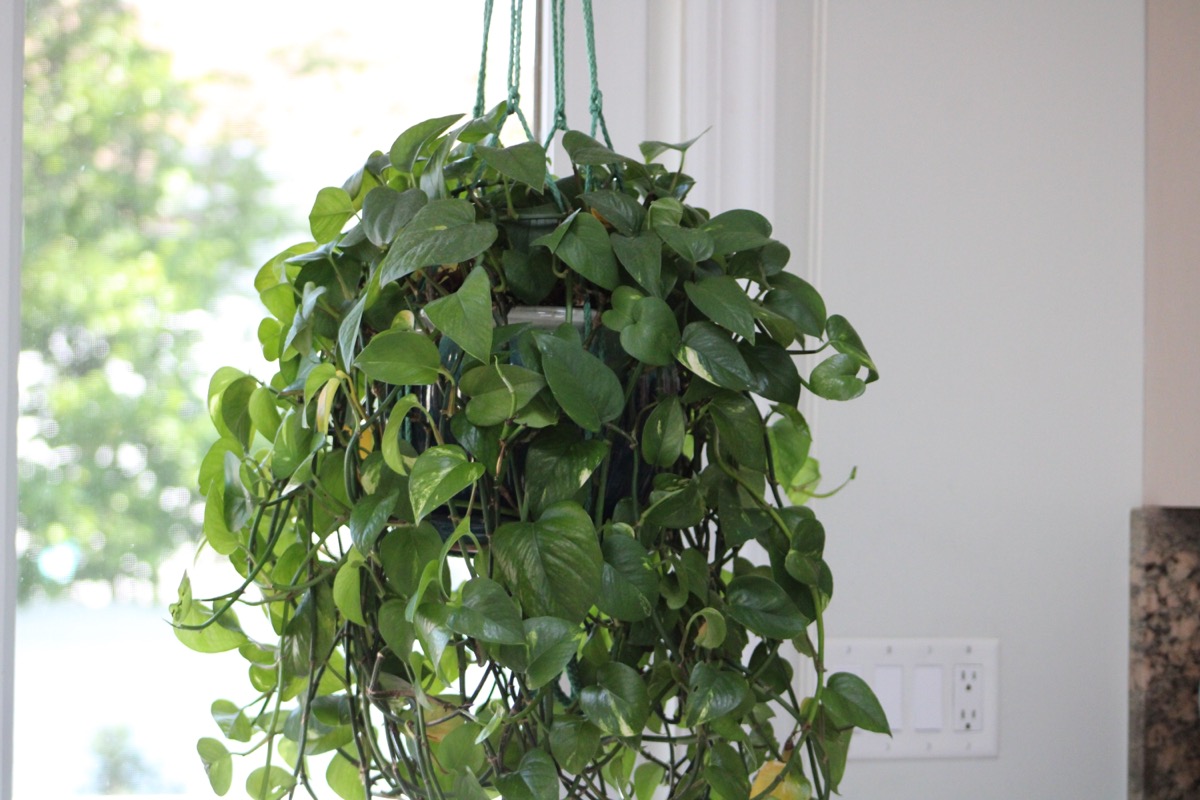
Known for their trailing vines and heart-shaped leaves, golden pothos plants were also found to be among the top-three best plants for boosting mental health, according to the study.
"The golden pothos is a beautiful house plant that is one of the easiest to care for and maintain," says Jena Joyce, founder and CEO at Plant Mother. "Even when the leaves begin to shrivel and you think it's on its way out, you give it some water and it comes right back to life."
Joyce believes that the plant's resilience can add to its mood-boosting effects. "It can be disheartening to pour your heart and soul into caring for a plant just to have it die. A golden pothos requires minimal light, and only needs water when the soil begins to dry," she tells Best Life.
"The ease of caring for this plant can help someone who might suffer from mental health issues like depression [since] if you forget to care for it for a week, it will still be kicking around. This encourages us to keep trying our best," she says.
For more plant advice delivered straight to your inbox, sign up for our daily newsletter.
7
Dragon Tree
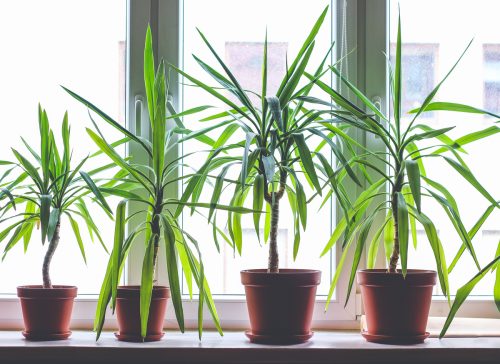
Adorned with slender, spikey, sword-like leaves, dragon trees are a sight to behold. They were also found to be effective in improving subjects' moods.
Bhatta says they prefer bright, indirect light but can tolerate lower light conditions. "Allow the soil to dry out partially between waterings, and avoid overwatering," he tells Best Life.
8
Palm
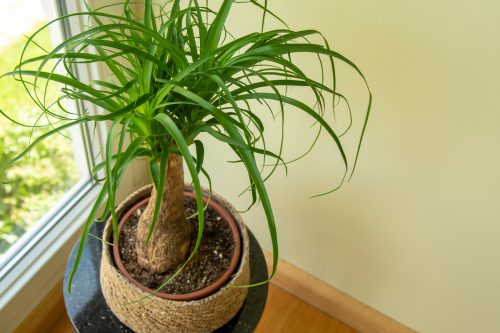
Finally, palms were found to be another top-three plant for boosting mood and mental health, according to the study.
To make sure they thrive, Cox suggests keeping palms in bright, indirect light and says you should water the plant when the top inch of soil is dry, to ensure proper drainage and prevent root rot.
"Palms, with their lush, feathery foliage, can create a tropical and serene atmosphere," Cox explains of their widespread appeal. "Their association with tropical destinations can evoke positive memories and a sense of relaxation."






















